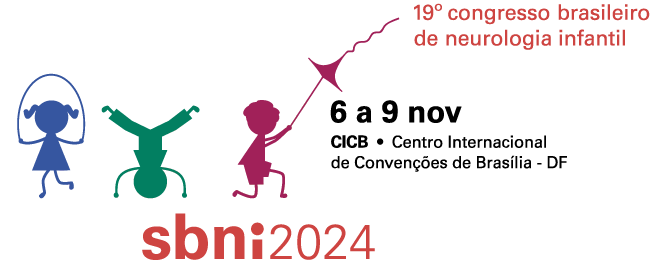Dados do Trabalho
Título
PATHOGENIC VARIANT IN THE PIGN GENE - INFANTILE EPILEPTIC ENCEPHALOPATHY
Apresentação do caso único
A 6-month-old female infant, at term, with no neonatal complications, developed central hypotonia and at the age of 4 months started focal, clonic seizures, initially in the left upper limb, progressing to the ipsilateral lower limb and eye blinking. The initial investigation has excluded infectious meningoencephalitis, hydroelectrolytic disorders and major brain malformations. An electroencephalogram was carried out with no significant alterations and magnetic resonance imaging of the skull showed plagiocephaly, increased subarachnoid space and altered posterior brainstem signals. The patient had no major congenital anomalies. The neurological examination revealed slight facial dysmorphisms and global hypotonia. A genetic investigation was carried out with a test for epilepsy and ataxia, resulting in two heterozygous pathogenic variants in the PIGN gene, which are associated with the multiple congenital anomalies - hypotonia - seizures type 1 syndrome. The patient is regularly taking levetiracetam, phenobarbital and clonazepam and has achieved partial control of her seizures.
Discussão
The patient in this case presents with an epileptic encephalopathy associated with pathogenic variants in the PIGN gene related to the Multiple Congenital Anomalies - Hypotonia - Seizures Syndrome type 1 (MCAHS1), a genetic disease caused by a homozygous or heterozygous mutation in this gene on chromosome 18q21, whose inheritance is autosomal recessive, rare, belonging to a group of defects in the biosynthesis of glycosylphosphatidylinositols, which are glycolipids that anchor and remodel cellular proteins. It is characterized by neonatal hypotonia, delayed neuropsychomotor development, seizures, dysmorphic features and variable congenital anomalies. The patient in question had most of the characteristics described and no congenital anomalies have been identified so far.
Comentários finais
The heterozygous pathogenic variant in the PIGN gene is associated with the MCAHS1, a rare and little-reported syndrome. The clinical case described shows the importance of genetic-molecular research into epileptic encephalopathies to assess their prognosis and guide family counseling.
Referências
Bukowska-Olech E., Glista F., Dinwiddie A., Pepler A. Rare multiple congenital anomalies-hypotonia-seizures syndrome type 1 (MCAHS1) – the clinical and molecular summary. European Journal of Medical Genetics, 2023. Disponível em www.elsevier.com/locate/ejmg. Acesso em 15 de junho de 2024.
Kniffin C. L., Multiple congenital anomalies-hypotonia-seizures syndrome 1, MCAHS1. 2024. Disponível em: https://omim.org/entry/614080. Acesso em 15 de junho de 2024.
Knaus, A., Pantel, J. T., Pendziwiat, M., Hajjir, N., Zhao, M., Hsieh, T.-C., Schubach, M., Gurovich, Y., Fleischer, N., Jager, M., Kohler, S., Muhle, H., and 24 others. Characterization of glycosylphosphatidylinositol biosynthesis defects by clinical features, flow cytometry, and automated image analysis. Genome Med. 10: 3, 2018. Note: Electronic Article. [PubMed: 29310717, images, related citations]. Acesso em 15 de junho de 2024.
Palavras Chave
Hypotonia; epilepsy; encephalopathy
Área
Neurogenética
Autores
MARIA MARIANA MUNIZ JORGE DE MELO , ANA PAULA BASTOS NOGUEIRA DE LUCA, PATRICIA SELESTRINI, ISAÍAS SOBRAL SOARES, GABRIELE MARIA FIOROTTO SILVÉRIO, JOANA MORAES DE REZENDE, PALOMA VIEIRA PIRES, MARLOS MELO MARTINS, FLAVIA NARDES DOS SANTOS
